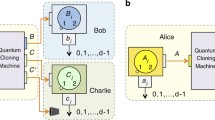Abstract
No cloning theorem is a very fundamental issue in quantum mechanics. But the issue is much more involved if we consider quantum state shared among two or more than two parties and allow only local operation and classical communication. In the context of the fact that no known bipartite entangled state can be cloned by local operation and classical communication (LOCC) without assistance of extra entangled state, the cloning of unknown orthogonal entangled state becomes meaningful when there is some supply of free entanglement. With restriction on supply of free entanglement, various cases have been studied. In this paper, we try to give an overview of the subject and results that have been obtained across the literature along with a new result on probabilistic LOCC cloning of four Bell states.
Similar content being viewed by others
References
Nielsen M.A., Chuang I.L.: Quantum Computation and Quantum information. Cambridge University Press, Cambridge (2002)
Wootters W.K., Zurek W.H.: A single quantum cannot be cloned. Nature (London) 299, 802–803 (1982)
Dikes D.: Communication by EPR devices. Phys. Lett. A. 92, 271 (1982)
Yuen H.P.: Amplification of quantum states and noiseless photon amplifiers. Phys. Lett. A. 113, 405–407 (1986)
Ghosh S., Kar G., Roy A., De Sen A., Sen U.: Distinguishability of Bell states. Phys. Rev. Lett. 87, 277902 (2001)
Horodecki M., De Sen A., Sen U., Horodecki K.: Local indistinguishability: more nonlocality with less entanglement. Phys. Rev. Lett. 90, 047902 (2003)
Fan H.: Distinguishability and indistinguishability by local operations and classical communication. Phys. Rev. Lett. 92, 177905 (2004)
Yang D., Horodecki M., Horodecki R., Synak-Radtke B.: Irreversibility for all bound entangled states. Phys. Rev. Lett. 95, 190501 (2005)
Owari M., Hayashi M.: Local copying and local discrimination as a study for nonlocality of a set of states. Phys. Rev. A 74, 032108 (2006)
Bennett C.H., DiVincenzo D.P., Fuchs C.A., Mor T., Rains E., Shor P.W., Smolin J.A., Wootters W.K.: Quantum nonlocality without entanglement. Phys. Rev.A. 59, 1070 (1999)
Ghosh S., Kar G., Roy A.: Local cloning of Bell states and distillable entanglement. Phys. Rev. A. 69, 052312 (2004)
Anselmi F., Chefles A., Plenio M.: Local copying of orthogonal entangled quantum states. New J. Phys. 6, 164 (2004)
Kay A., Ericsson M.: Local cloning of arbitrarily entangled multipartite states. Phys. Rev. A. 73, 012343 (2006)
Choudhary S.K., Kunkri S., Rahaman R., Roy A.: Local cloning of entangled qubits. Phys. Rev. A. 76, 052305 (2007)
Gheorghiu V., Yu L., Cohen S.M.: Local cloning of entangled states. Phys. Rev. A. 82, 022313 (2010)
Rahaman R.: Comment on local copying of d × d-dimensional partially entangled pure states. Int. J. Theor. Phys. 49, 657 (2010)
Dür, W., Vidal G., Cirac J.I.: Three qubits can be entangled in two inequivalent ways. Phys. Rev. A. 62, 062314 (2000)
Smolin J.A.: Four-party unlockable bound entangled state. Phys. Rev. A. 63, 032306 (2001)
Yang D., Chen Y.-X.: Mixture of multiple copies of maximally entangled states is quasipure. Phys. Rev. A. 69, 024302 (2004)
Walgate J., Short A.S., Hardy L., Vedral V.: Local distinguishability of multipartite orthogonal quantum states. Phys. Rev. Lett. 85, 4972 (2000)
Terhal B.M., Horodecki P.: Schmidt number for density matrices. Phys. Rev. A 61, 040301(R) (2000)
Choudhary S.K., Kar G., Kunkri S., Rahaman R., Roy A.: Local cloning of genuinely entangled states of three qubits. Phys. Rev. A 76, 062312 (2007)
Życzkowski, K., Horodecki P., Sanpera A., Lewenstein M.: Volume of the set of separable states. Phys. Rev. A 58, 883 (1998)
Vidal G., Werner R.F.: Computable measure of entanglement. Phys. Rev. A 65, 032314 (2002)
Ghosh S., Kar G., Roy A., Sarkar D.: Distinguishability of maximally entangled states. Phys. Rev. A 70, 022304 (2004)
Rahaman R.: Local cloning of CAT states. Phys. Lett. A 375, 2291–2295 (2011)
Author information
Authors and Affiliations
Corresponding author
Rights and permissions
About this article
Cite this article
Kar, G., Rahaman, R. Local cloning of multipartite entangled states. Quantum Inf Process 11, 711–727 (2012). https://doi.org/10.1007/s11128-011-0281-7
Received:
Accepted:
Published:
Issue Date:
DOI: https://doi.org/10.1007/s11128-011-0281-7




